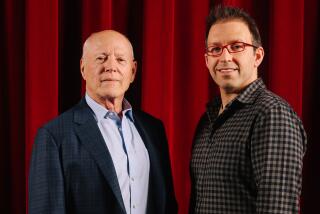Lovell & Matz: Home Stage for AIDS Care
- Share via
Marilyn Lovell, slender, vibrant and elegant in a sequinned Bob Mackie outfit, delivers an upbeat version of “Come Fly With Me.” Behind her, husband Peter Matz accompanies her on piano, with drums and bass backing him up nearby. Lovell segues into “You Go to My Head,” eyes closed, riding out each note with mesmerizing concentration, her voice ranging from husky to lilting. The audience is rapt, some seeming nearly to swoon, before she rouses them suddenly by belting out a medley from “Hello, Dolly!”
When Lovell and Matz finish their polished act an hour later, the applause is loud, heartfelt, sustained.
It could be the stage of the Cinegrill, the Gardenia, the Backlot. But it’s not.
It’s the sun-dappled living room of singer Melissa Manchester and her husband, Kevin DeRemer, on a Sunday afternoon in the hills of Encino. And there is no paycheck waiting for Lovell and Matz for their well-rehearsed work.
Instead, they have just raised several thousand dollars that will go directly to the Home Health Care Program of nonprofit AIDS Project Los Angeles (APLA). The money will be used to help local people with AIDS live at home in comfort and dignity, rather than suffering a needless hospital stay--or even more grim situations--if they’re turned away. An APLA official calls home care “the most humane and also the most cost-effective way to care for PWAs (people with AIDS).”
The occasion is Manchester’s birthday. She has invited some 50 friends to a “Matz party”--as the project informally calls these fund-raisers--in lieu of receiving gifts. The project asks for a minimum donation of $50, but many guests have made out checks for considerably more.
“What a lovely idea not to get presents, but to give them,” said Manchester, who has provided refreshments. “It celebrates wonderful songwriting and wonderful singing and being silly and coming together to listen to quality music. And it benefits a worthy cause. What a rarified hour.”
Lovell and Matz--she’s a professional singer of wide-ranging experience; he’s been a noted composer-conductor-arranger for the likes of Noel Coward and Barbra Streisand--have performed 16 of these concerts in the past year, raising more than $80,000 for the project. In recent months, the couple has earmarked proceeds--nearly $40,000--specifically for the Home Health Care Program.
Lovell and Matz have appeared in the homes of entertainment industry “names,” such as Rosemary Clooney, as well as those of plainer folk. If they can find enough hosts--including, they hope, corporate sponsors for employee parties--they would like to do roughly a concert a week. Already, they’re branching into larger venues, with a three-performance engagement scheduled at the Pasadena Playhouse, Thursday-April 1.
Because there’s no overhead, 100% of the donations goes to provide home-care services for needy people with AIDS, according to project officials--an average of $135 per day for about 150 clients, with a growing waiting list (nursing services alone can cost from $44 to $1,848 per week, depending on the individual need).
Nothing but a room is needed for the parties--even the piano is provided--and project volunteers tidy up afterward.
The gatherings also allow the organization to reach and “educate” a new group of potential donors and volunteers, said Matt Redman, a project board member and its former chairman.
“They’ve done this entirely out of the generosity of their hearts,” Redman said of Lovell and Matz. “It’s really an extraordinary thing for someone to come to us and commit for such a long period of time. It’s amazing and just lovely.”
Lovell and Matz were active and visible in the musical world of New York in the 1960s, but “kept missing each other,” Matz said, at one time working literally on the opposite sides of a studio wall without meeting.
At the peak of her career in the late 1960s, Lovell toured with Mary Martin in the international production of “Hello, Dolly!” But in 1967, she gave up performing and came to Los Angeles to major in psychology as an undergraduate at UCLA, simultaneously studying to be a psychiatric technician at Los Angeles Trade Technical College. During a 1,630-hour internship at psychiatric hospitals, she used her performing background as a “psycho-dramatist” in therapy sessions. In 1969, after occasional TV guest appearances, she left show business entirely to work as a full-time psychotherapist.
Matz came West in 1971 to be musical director for “The Carol Burnett Show”--a job he held for eight years--while also scoring movies (his most recent film score was for “Torch Song Trilogy,” with “The Gumshoe Kid” upcoming).
In 1978, a friend introduced them, and they married in June, 1981.
The idea of AIDS fund-raisers was born three years ago, when friends asked them to perform at a wedding.
“We put together a monstrous medley of love songs,” Matz recalled during an interview in his cluttered office in the Fairfax district. “The response was very powerful--people seemed quite touched by it--and Marilyn had this great idea to put it to good use.”
“My awareness of what to do was very clear to me,” Lovell said. “I work in an area of psychotherapy with men and women whose focus is on their own social adjustment. Most happen to be homosexual.”
As gay men, and more recently growing numbers in the Hispanic community, became devastated by the AIDS epidemic, she said, she felt compelled to help. With no cure in sight, her attention turned to home and hospice care “because it’s terribly neglected. During the last 10 days to two weeks of a PWA’s life, (many) need 24-hour care. And because they haven’t wanted to look at (this problem), they aren’t prepared for it. Neither are family, lovers, friends--and when the time comes, there’s no place to go.”
Home care, said Lovell, allows “a quiet, peaceful way, with whatever you want around you--your dogs, cats, whatever gives you joy and comfort.”
Matz said they decided to do continuing fund-raising concerts because “people have to be made aware that this isn’t going to be solved by attending one big, glitzy event each year. It has to be an ongoing commitment.”
They took a year-and-a-half to put their act together, enlisting industry support. Designer Mackie loaned Lovell a wardrobe. Walter and Charlene Painter helped with choreography. Piano dealer David Abell provides pianos to hosts who don’t have one. If they do, Wes Velkov, a studio tuner, tunes them for free. Graphic artists Lou Falcone and Kristen Gloviak and publicist Rick Miramontez donate their time for promotion and publicity. Backup musicians frequently hand back their fees.
Despite the preparation, the act wasn’t altogether smooth in the beginning. One night, Matz placed a cup of hot tea on his piano, “which Marilyn hit with a sweep of her hand into my lap--which made it hard playing slow tempos.”
Then there was the evening Matz wore a Mountie hat like Nelson Eddie to sing “By the Sea” from Sondheim’s “Sweeney Todd.” Lovell couldn’t stop laughing.
“It was disaster, absolute disaster,” Matz said, chortling.
James Hansen, director of creative affairs for Marstar Productions, who helps coordinates the Matz parties, sounds like a publicist when he speaks of the couple: “These are major, major pros in their industry. This is not just a night (or afternoon) about AIDS, but a night of entertainment most people experience only once or twice in a lifetime.”
There is a footnote to all this: Five years ago, Lovell was diagnosed with multiple sclerosis, a chronic, degenerative disease of the central nervous system that affects muscular coordination and sometimes causes speech defects. She has been in daily physical therapy since.
Offstage, she limps (“my rhythm of walking is unpredictable”), and sometimes needs support while standing. She has a companion, which she calls Jane the Cane, and suffers constant pain.
But none of it shows during her performances.
Matz rises from behind his desk to join his wife at the door to demonstrate their well-rehearsed “system” of careful pacing and turns that allows her a graceful entrance. Crossing the room, they signal each other with nods, changing hands deftly as he shifts his support. He calls it their “Fred and Ginger” routine.
“It’s a great exercise for being centered,” she said, “so that by the time I arrive at the piano, I have no stage fright.”
Relentlessy accentuating the positive, she said her own illness has given her extra empathy when counseling people with AIDS.
“Imagine what it is for me to be standing up singing with Peter Matz playing the piano,” she said of her return to performing in the autumn of life.
She smiled radiantly.
“That’s the best that there is!”
More to Read
The biggest entertainment stories
Get our big stories about Hollywood, film, television, music, arts, culture and more right in your inbox as soon as they publish.
You may occasionally receive promotional content from the Los Angeles Times.










